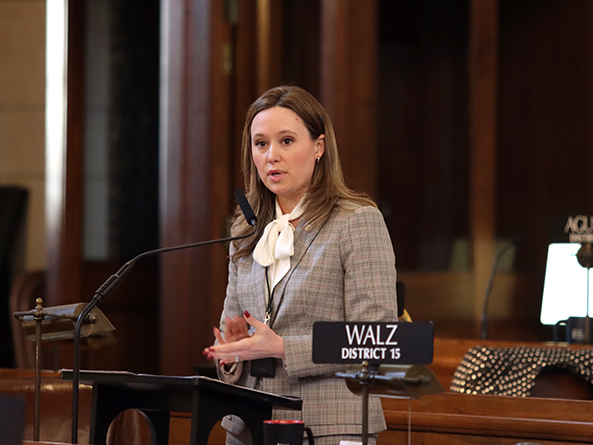Statewide behavioral health model clears first round
Lawmakers advanced a bill to select file March 28 that would implement a new statewide delivery model for behavioral health service provision in Nebraska.

LB276, introduced by Lincoln Sen. Anna Wishart, would adopt the Certified Community Behavioral Health Clinic Act in an attempt to increase access to outpatient mental health and substance abuse treatment through service delivery coordination with community partners.
The CCBHC model began in 2017 as a Medicaid demonstration project in collaboration with grants provided by the federal government, Wishart said, and there currently are approximately 500 CCBHC’s in 46 states across the country.
The state Department of Health and Human Services would be required to apply for a Medicaid state plan amendment through the federal Centers for Medicare and Medicaid Services to implement the bill’s provisions by Jan. 1, 2026.
Under the CCBHC model, DHHS would develop a prospective payment system through which providers would be reimbursed based on the anticipated cost of providing required services to Medicaid recipients on either a daily or monthly basis, rather than on a fee-for-service basis.
Wishart said the goal of CCBHC clinics is to provide community-based mental health and substance use disorder services through collaboration between health care facilities and community partners. Such services have long been underfunded by the state, she said.
A 2016 rate study done by the DHHS Division of Behavioral Health found that provider rates were between 15 and 40 percent below the cost of providing services, she said.
“That is what our providers have had to contend with for years, and yet they continue to provide services to Nebraskans,” Wishart said. “Now is the time to invest in a modest increase in Medicaid match dollars, because this new delivery model has proven its effectiveness in savings to governmental entities all across the country.”
A Health and Human Services Committee amendment, adopted 45-0, would cap any general fund appropriations to the program at $4.5 million annually, which Wishart said would be matched by federal funds.
Sen. John Arch of La Vista, a former hospital administrator, supported the bill and the amendment, saying the state should embrace the new service model. Arch said he previously had been hesitant about CCBHCs, but results from other states in recent years and support for the project from the governor and DHHS have changed his mind.
“I’ve come to the conclusion now — having seen outcomes … cost results and the benefits to the recipients of these services — that it’s time for us to take the step,” Arch said.
Also in support was Lincoln Sen. Danielle Conrad, who cautioned fellow lawmakers not to ignore other issues with the state’s behavior health system, including a lack of funding in the governor’s proposed budget for behavioral health provider rate increases.
“Let’s not wrap ourselves up as being the great supporters and defenders of behavioral health and mental health on a very small piece of the puzzle when we’re not willing to take a hard look at the big picture,” Conrad said. “This is one step forward, but we’ll see if your intentions are pure and true as we take up other aspects regarding mental health, including the budget.”
Senators voted 46-0 to advance LB276 to select file.


